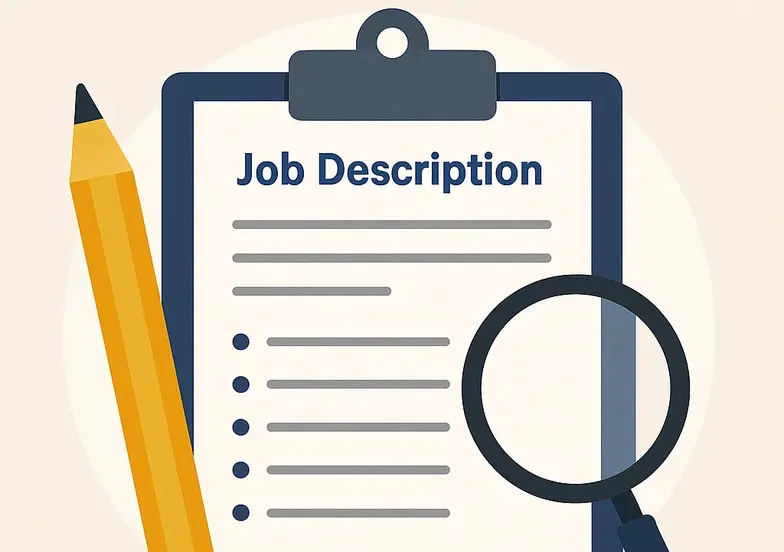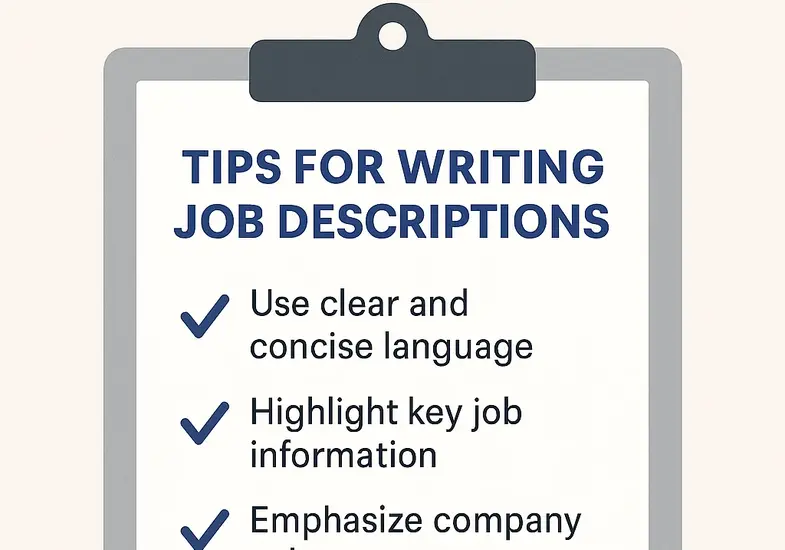Home » Hire » How to Write a Job Description: A Step-by-Step Guide for Employers
How to Write a Job Description: A Step-by-Step Guide for Employers
https://www.whatjobs.com/info/hire/how-to-write-a-job-description

Introduction
Hiring the right person starts with writing the right job description. Whether you’re expanding your team or replacing a key player, the job description is your first—and sometimes only—chance to attract top talent. But many companies still get it wrong: they use vague language, unclear expectations, or fail to highlight what makes the job (and company) appealing.
This guide will walk you through how to write a job description that’s clear, comprehensive, and attractive to the most qualified candidates. You’ll learn what to include, what to avoid, how to optimize for search engines, and how to align your listings with your employer brand.
Why a Well-Written Job Description Matters
A job description is more than a simple checklist. It’s a marketing tool, a filter, and a commitment—all in one.
Here’s why it’s so important:
- Attracts the Right Candidates
A good job description will pull in candidates who are actually qualified—and deter those who aren’t. - Improves Application Quality
The more specific and realistic the description, the more likely you are to receive targeted applications. - Clarifies Expectations
It sets a mutual understanding of what success in the role looks like. - Strengthens Your Employer Brand
A polished, well-written job description reflects your company’s professionalism and culture. - Saves Time and Money
Better descriptions mean fewer rounds of hiring and faster onboarding.

Key Components of a Job Description (with Examples)
To create a clear and complete job description, include these nine essential components:
1. Job Title
Be specific and use industry-standard titles. Avoid buzzwords or company-internal jargon.
Good: “Software Engineer – Backend”
Avoid: “Tech Rockstar” or “Code Wizard”
Tip: Use job titles that candidates are likely to search for on Google or job boards.
2. Job Summary
This short paragraph (2–4 lines) introduces the role and its impact on the company.
Example:
“We are looking for a detail-oriented Digital Marketing Analyst to support campaign performance and optimize engagement through data insights. This role is central to our growth marketing strategy.”
3. Duties and Responsibilities
List 6–10 core responsibilities. Use bullet points and start each item with a strong action verb.
Example:
- Manage and execute paid media campaigns across Google and Meta
- Collaborate with creative team to test new ad formats
- Analyze performance data and report weekly KPIs
- Recommend optimization strategies based on audience segmentation
4. Required Skills and Qualifications
List only what’s essential for success. Avoid “wish lists” that may discourage capable applicants.
Example:
- Bachelor’s degree in Marketing, Statistics, or related field
- 2+ years of experience in digital campaign analytics
- Proficient in Google Analytics, Looker Studio, and Excel
5. Preferred Skills (Optional)
This section is great for showing what might set an applicant apart—but be clear it’s not mandatory.
Example:
- Experience with SQL or Python
- Knowledge of e-commerce funnels
- Certification in Google Ads or Meta Blueprint
6. Salary and Benefits
If possible, include a salary range. Transparency builds trust and attracts more applicants.
Example:
“Salary range: $65,000 – $80,000 DOE. Benefits include remote-first working, flexible hours, private healthcare, and annual learning stipends.”
7. Work Environment and Location
Clarify whether the job is remote, hybrid, or onsite, and mention working hours or travel expectations.
Example:
“This is a hybrid role based in our Austin, TX office, with 2–3 in-office days per week. Standard working hours are 9 AM to 5 PM CT.”
8. About the Company
Sell your company! This is your chance to explain your mission, culture, and why someone should want to work there.
Example:
“At WhatJobs, we connect millions of people around the world to new opportunities. Our team is collaborative, innovative, and committed to creating meaningful impact.”
9. How to Apply
Include a strong call-to-action. Tell candidates where and how to submit their application.
Example:
“Apply by submitting your CV and a short cover letter through our careers page. We review applications weekly.”
Full Example Job Description
Here’s how it all comes together:
Job Title: Customer Success Manager
Location: Remote – UK or Ireland preferred
Salary: £45,000–£55,000 DOE
Summary:
We are seeking a Customer Success Manager to drive retention and growth by managing relationships with our key clients. You’ll serve as a trusted advisor, helping customers maximize the value of our platform.
Responsibilities:
- Manage a portfolio of enterprise clients
- Conduct onboarding and quarterly success reviews
- Track and optimize client KPIs
- Liaise with product team on feature feedback
- Upsell premium solutions and drive renewals
Required Qualifications:
- 3+ years in B2B customer success or account management
- Strong communication and relationship management skills
- Familiarity with CRM tools (e.g., HubSpot, Salesforce)
Preferred Qualifications:
- Experience in SaaS or recruitment tech
- Knowledge of churn and LTV metrics
- Multilingual (French or German is a plus)

About Us:
WhatJobs is one of the fastest-growing global job platforms. Our mission is to connect people to life-changing opportunities—and have fun while doing it.
How to Apply:
Submit your CV via our website or email talent@whatjobs.com. Applications close on the 30th of this month.
Tips for Writing Style and Formatting
- Use active voice: “You will manage…” not “You will be responsible for…”
- Keep paragraphs short and skimmable
- Avoid internal acronyms or buzzwords
- Use inclusive language: Gender-neutral, accessible, and diverse
- Format consistently: Use the same font, bullet style, and section headers
Legal & Compliance Considerations
- Avoid phrasing that may be interpreted as discriminatory (e.g., age, gender, nationality).
- Include an Equal Opportunity Statement:
“WhatJobs is an equal opportunity employer. We celebrate diversity and are committed to creating an inclusive environment for all employees.” - Mention physical or scheduling requirements only if essential.
- Ensure your job ad complies with local labor laws (wages, breaks, overtime).
SEO Tips for Job Descriptions
To help your job description rank better on Google Jobs and search engines:
- Include the job title in your page title, H1, and first paragraph
- Use the job title 3–4 times naturally throughout the post
- Use structured data: Add JSON-LD schema for JobPosting
- Write unique descriptions: Don’t duplicate job postings across pages
- Optimize for mobile: Keep content clean and scannable on small screens
Frequently Asked Questions (FAQ)
How long should a job description be?
400–700 words is standard, but more complex roles may require up to 1,000. Use headings and bullets to improve readability.
Should I include the salary in the job description?
Yes—job seekers prefer transparency. Salary ranges boost visibility and trust.
Can I reuse the same job description for different roles or locations?
Not without changes. Tailor the copy slightly for different offices, teams, or seniority levels.
How often should I update my job descriptions?
At least once a year, or when key responsibilities or qualifications change.
Final Thoughts
A compelling job description isn’t just a hiring formality—it’s your first impression, your brand ambassador, and your filter for talent. By following the tips, structure, and examples in this guide, you can attract better applicants, reduce time-to-hire, and improve retention.
Take the time to get it right. Because the right job description doesn’t just describe a job—it opens a door to opportunity.